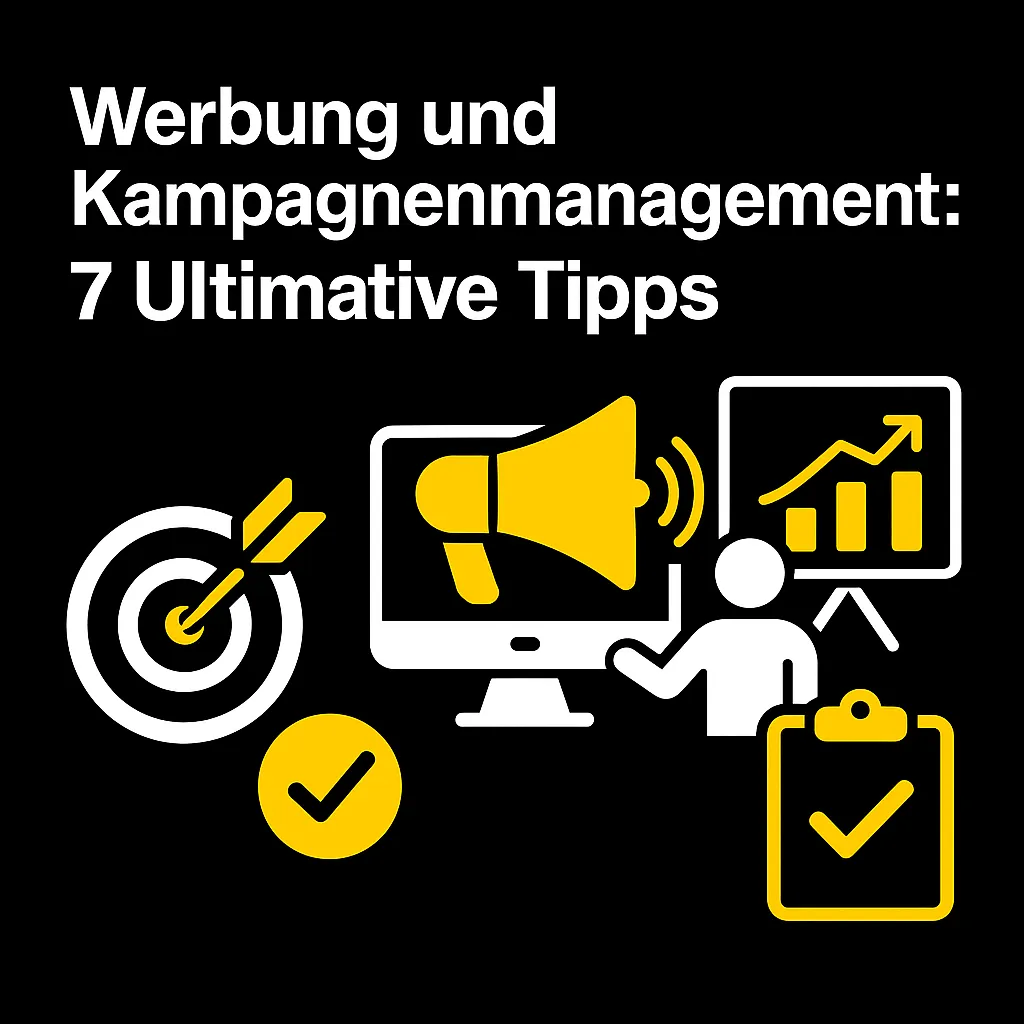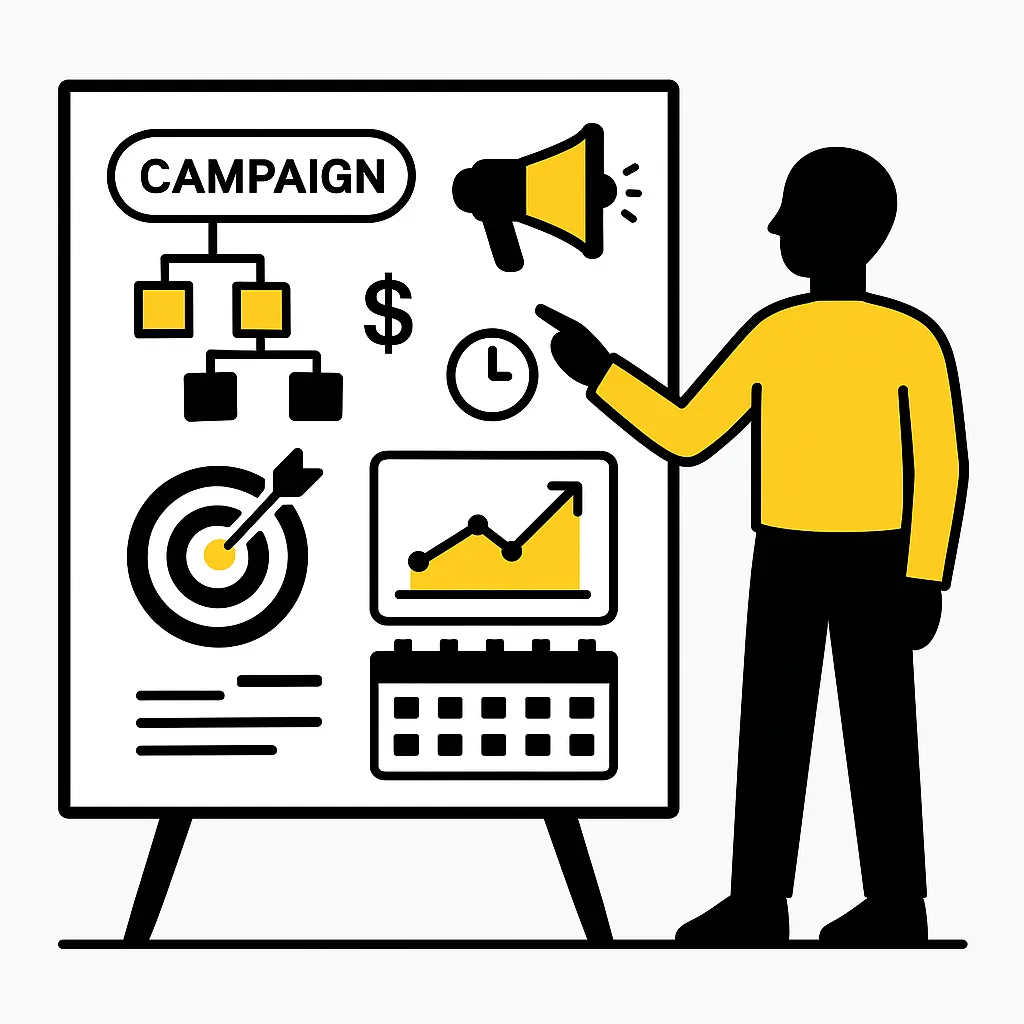Advertising and campaign management: 7 ultimate tips
Welcome to this comprehensive article about advertising and campaign management. Here you will learn how to optimally plan, successfully implement and continuously improve your advertising campaigns. This guide will not only help you to make your brand better known, but also to use your budget efficiently and achieve solid long-term success.
Whether you are planning online campaigns in the form of search engine marketing or relying on classic print ads - targeted advertising and campaign management form the foundation of every successful marketing strategy. In this article, we take a deep dive, show you specific examples and give you tips that you can implement straight away.
Whether online or offline: The agency takes over the planning, implementation and optimization of your campaigns. If you want to focus on digital outdoor advertising, Smadooh Media (DOOH - Digital-Out-Of-Home) is the right partner for you. Here you can make your brand stand out with digital advertising spaces in public areas.
APALION MARKETING AG
What is advertising and campaign management (definition)?
The term advertising and campaign management describes all processes that serve to plan, implement and control advertising measures (marketing measures). The aim here is to convey the right messages to the right target group - using the right strategies, channels and methods.
Advertising
Advertising is any form of communication that you use to present your product, brand or service. You can use online channels (e.g. social media, search engines) or offline channels (e.g. print, billboard advertising).
Campaign management
This term refers to how you structure, plan and implement your advertising campaigns. This includes budget planning, scheduling, creative design and measuring success.
In essence, advertising and campaign management means that you think through and professionally coordinate all steps from the initial idea to the final evaluation.
APALION MARKETING AG NEWS
„Data-driven campaigns“ is a very big topic, so there is always news.

Especially in times of digitalization, social media and increasing competition, professional advertising and campaign management can make all the difference.
Why is advertising and campaign management so important?
In a world full of impressions and competitors, it is no longer enough to simply have a great product. You have to actively make sure that your target group notices your offer and recognizes a clear added value. If you neglect your advertising and campaign management, you may not reach potential customers or spend your budget inefficiently.
Structured advertising and campaign management enables you to:
Point 1
Set clear goals and make progress measurable.
Point 2
Use your budget effectively and minimize wastage.
Point 3
Addressing your target group via the right channels and formats.
Point 4
Analyze success and failure to better optimize future campaigns.
Core tasks in advertising and campaign management
Well thought-out advertising and campaign management basically involves the following key tasks:
Target definition
What do you want to achieve with your campaign? More awareness, leads, sales or brand building?
Target group analysis
Which personas (fictional characters of your target group) appeal to you the most? What problems, needs and interests do they have?
Strategic planning
Which advertising channels (online marketing, print, radio, etc.) are best suited? For example, do you want to run social media campaigns or do you want to focus on outdoor advertising?
Concept development
What should your message look like? Which texts, images, videos or slogans best showcase your idea?
Budget and time planning
How much money is available and for how long should your campaign run?
Implementation
Now it's time for the practical implementation. Online campaigns are set up on platforms such as Facebook, Instagram or Google, print ads have to be designed and booked, and cooperation partners may also have to be involved.
Control and optimization
Tracking is crucial. You use tools (software tools) and regular evaluations (reports) to monitor whether your advertising measures are working. You then adjust the campaign to achieve better results.
Start now with a free initial consultation
Important channels and formats for successful campaigns
Choosing the right channels is crucial to the success of your campaign. In modern advertising and campaign management, there are a multitude of possibilities:
What do I stand for?
What distinguishes my brand from others?
Which values are particularly important to me?
How do I want my target group to feel when they come into contact with my brand?
Brand identity (the unmistakable self-image of a brand) is the heart of your entire appearance. It influences your communication and determines which content fits your brand and which does not.
The 7 ultimate tips for your advertising and campaign management
Tip 1: Define crystal clear goals
It sounds banal, but without clear goals you cannot measure whether your advertising and campaign management is successful. Ask yourself:
Do you want to increase awareness?
Generate more leads?
Sell directly?
Define key performance indicators (KPIs), such as the number of clicks, orders or newsletter registrations.
Tip 2: Really understand your target group
No matter how much budget you put into your advertising and campaign management - if your target group is not picked up, you will be unsuccessful. Create buyer personas to get a clear picture of your desired customers. Ask yourself: What problems do they have, how old are they, where do they live and what media do they consume?
Tip 3: Find the right channels
Not every channel is suitable for every product. If you want to address a younger target group, platforms such as TikTok or Instagram may be more important than print media. So don't just focus on reach, but on relevance.
Tip 4: Plan a realistic budget
Don't overestimate your budget and at the same time don't throw in the towel too quickly if success is not immediately visible. Marketing and advertising are often a long-term game. Allow enough time for testing and calculate sufficient funds to try out different variants.
Tip 5: Creativity + strategy = formula for success
A memorable idea sticks and arouses curiosity. Incorporate strong images, distinctive language or surprising elements. At the same time, you must proceed in a structured manner. That's why creativity and strategy should go hand in hand in your advertising and campaign management.
Tip 6: Use digital outdoor advertising (DOOH) for more visibility
With DOOH (digital outdoor advertising) you stand out from classic poster advertising. Moving images, eye-catching animations or interactive elements are more memorable. Thanks to Smadooh Media (DOOH), you can create campaigns that can be controlled flexibly, for example only at certain times of day or even according to the weather.
Tip 7: Measure, analyze and constantly optimize
Successful advertising and campaign management does not end with the start of the campaign. On the contrary: the constant analysis of your KPIs shows you whether your measures are working. You can use the results to fine-tune texts, images, formats and budgets. This is the only way to achieve real improvements in the long term.
Data-driven campaigns
Practical examples
Here you will find some practical examples of advertising and campaign management that will show you how you can apply what you have learned:
Develop a clear content strategy
- A young company wants to increase awareness of a new product.
Campaign objective:Reach and brand buildingChannels: Instagram, TikTok
Measures: Short videos with modern trends, hashtags, influencer collaborations
Result: Within four weeks, the number of followers increased by 30%, and the number of
Website visits increased by 50%.
- An established fashion store wants to invite customers to a sale.
Campaign objective: More visitors to the store, increase sales
Channels: Digital displays in shopping centers (DOOH - Digital-Out-Of-Home)
Measures: Animated videos that advertise discount campaigns, combined with a clear call-to-action („Come by now and save!“)
Result: Around 20% more walk-in customers, increased sales during the sale period.
- An online store for sporting goods wants to generate more orders for a new product segment.
Campaign objective: Increase in orders
Channels: Google Ads, Bing Ads
Measures: Ad groups for different subcategories (e.g. running shoes, fitness equipment), landing page optimization (landing pages with a focus on the buying experience)
Result: Increase in orders by 15% in just one month, return on advertising spend (ROAS) improved by 25%.
Start your project now
If you're passionate about content marketing and branding and are ready to take your brand to the next level, you've come to the right place. Apalion just right. As an experienced SEO and web agency, we support you in developing a creative strategy that suits your company and has a lasting effect.
Apalion marketing ag
Everyday challenges and how to overcome them
Lack of time
- Solution:
Prioritize, delegate tasks and use automation (e.g. automated email routes, planning software).
Budget pressure
- Solution:
Rely on targeted online and DOOH campaigns with clearly defined target groups so that there is little wastage.
Rapid changes in the market
- Solution:
Test different ad variants (A/B testing) and optimize continuously instead of launching the entire campaign just once.
Flood of data and tracking
Solution:
Use simple, clear reporting tools, define a handful of KPIs and focus on these instead of every metric
Despite all the theory, you often come across the following stumbling blocks in advertising and campaign management:
How to create content that inspires
You may be wondering why you shouldn't do everything in-house. An experienced agency like APALION can make your advertising and campaign management much easier:
⦁ Expertise
Whether SEO (Search Engine Optimization), SEA (Search Engine Advertising), social media or web development - you benefit from specialist knowledge in all disciplines.
⦁ Strategic consulting
You get a holistic view of which channels and campaign formats suit your company.
⦁ Conservation of resources
An agency takes over the operational work so that you can concentrate on your core business.
⦁ Flexibility and scaling
If your campaigns grow quickly or new markets are opened up, the agency has the capacity and contacts to handle this.
If you would like to delve deeper into the theoretical background of advertising and campaign management, it is worth taking a look at the Wikipedia definition of marketing. There you will find additional information and further literature.
FAQ - Advertising and campaign management
Here are some typical questions that customers ask us about online marketing. Perhaps this will help you if you are still unsure.
What is meant by advertising and campaign management?
Advertising and campaign management refers to the strategic planning, implementation, control and optimization of advertising measures. The aim is to make a brand visible, address the right target group and achieve measurable success - both online and offline.
Why is professional campaign management so important?
Well thought-out campaign management ensures that your budget is used efficiently, that your message gets across and that you remain competitive in the long term. Without a clear structure, time, money and reach are lost.
Which channels are best suited for advertising campaigns?
It depends on your target group. Common channels are:
-
OnlineSocial media, Google Ads, SEO, e-mail marketing
-
Offline: Print, Radio, TV
-
DOOH (digital outdoor advertising)LED screens, interactive displays in public spaces
-
EventsTrade fairs, sponsoring
What does a professional advertising campaign cost?
-
The budget varies depending on the objective, channel and scope. Small campaigns start at a few hundred euros, while larger projects can cost several thousand euros. Realistic planning and continuous monitoring of expenditure (return on advertising spend - ROAS) are important.
How do I measure the success of my campaign?
Successes are measured on the basis of Key Performance Indicators (KPIs) measured, e.g:
-
Click figures
-
Conversion rate
-
Range/impressions
-
Sales development
-
Engagement (likes, comments, shares)









